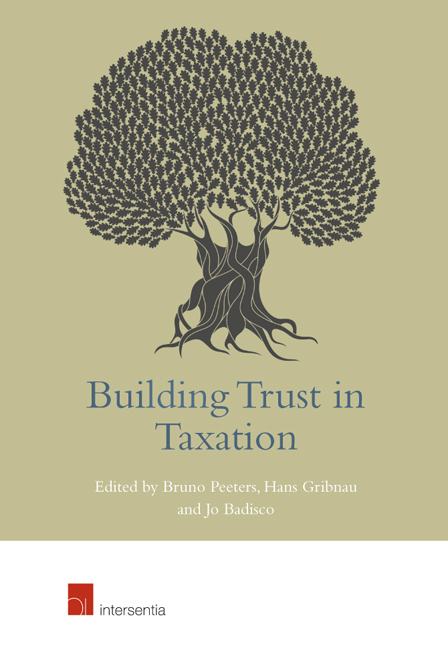Book contents
- Frontmatter
- Preface
- Contents
- List of Authors
- Introduction
- PART I TAXATION, STATE AND SOCIETY: RECIPROCITY AND THE LIMITS OF THE POWER TO TAX
- PART II Trust and morality: tax governance in need of transparency
- PART III International taxation: in search of democratic legitimacy
- PART IV Behavioural aspects of taxation and trust
Introduction
Published online by Cambridge University Press: 21 September 2018
- Frontmatter
- Preface
- Contents
- List of Authors
- Introduction
- PART I TAXATION, STATE AND SOCIETY: RECIPROCITY AND THE LIMITS OF THE POWER TO TAX
- PART II Trust and morality: tax governance in need of transparency
- PART III International taxation: in search of democratic legitimacy
- PART IV Behavioural aspects of taxation and trust
Summary
The position paper for the conference was originally centred around five aspects relevant to the crisis in the realm of taxation. Each of these issues was described in the form of a hypothesis that might shed some light on the interplay between taxation and trust.
1. Inequality between citizens
2. Societal culture and civic solidarity
3. The institutional environment at the national and international levels
4. Political parties and ideologies
5. Corporations
The first aspect deals with the question whether social and economic inequality between citizens in itself can cause this loss of trust in the tax system. A possible hypothesis worth investigating is whether these social and economic inequalities can corrode citizens ‘ sense of solidarity. If this is the case, then this is another reason to manage and search for ways to lessen inequality.
The second aspect concerns the relation between societal culture and civic solidarity. Are there broader societal or cultural developments that might explain citizens ‘ decreased willingness to be solidary with each other through taxation? What are the cultural as well as economic conditions for solidarity? What are the prerequisites for the acceptance of redistributive taxation and how might they be influenced by some recent and less recent developments such as individualism, depolitisation or multiculturalism?
The third issue is the institutional environment at the national and international levels. On the one hand there is economic globalisation but on the other hand international institutions are weak. This clearly affects the possibilities and credibility of national tax policies. Within this framework it is sometimes questionable whether it is still possible to expect citizens and corporations to be loyal to state-centred tax authorities. The question arises whether it is not time to further develop international rules and institutions which are responsible for taxing multinational corporations. Or might it instead be a better approach to expect international institutions to persuade national governments to adopt converging tax policies.
The fourth aspect concerns political parties and ideologies. The main question here is whether politics matters.
- Type
- Chapter
- Information
- Building Trust in Taxation , pp. 1 - 14Publisher: IntersentiaPrint publication year: 2017



